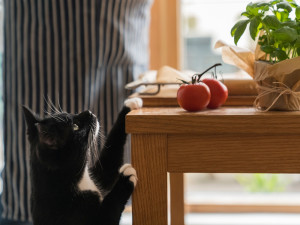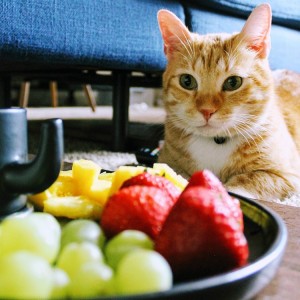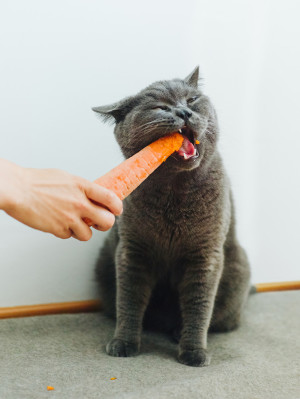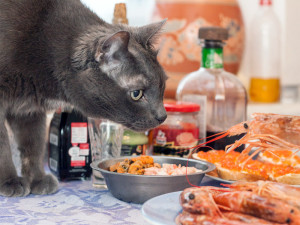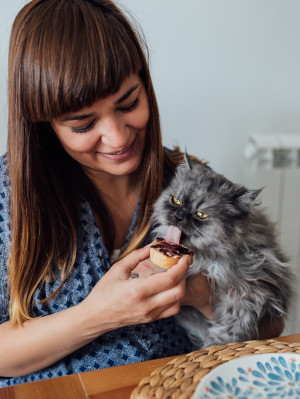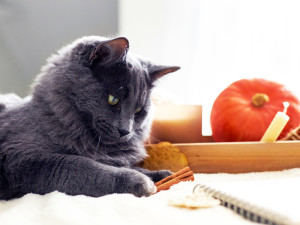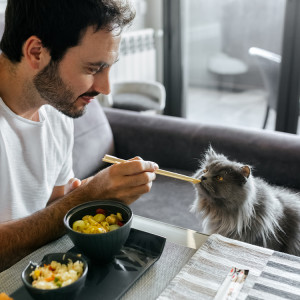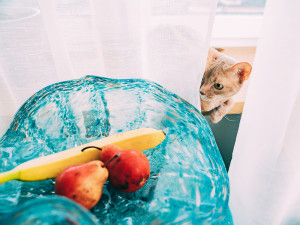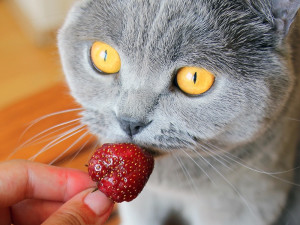Can Cats Eat Cucumbers?
We already know they’re scared of them, thanks to all those YouTube videos.
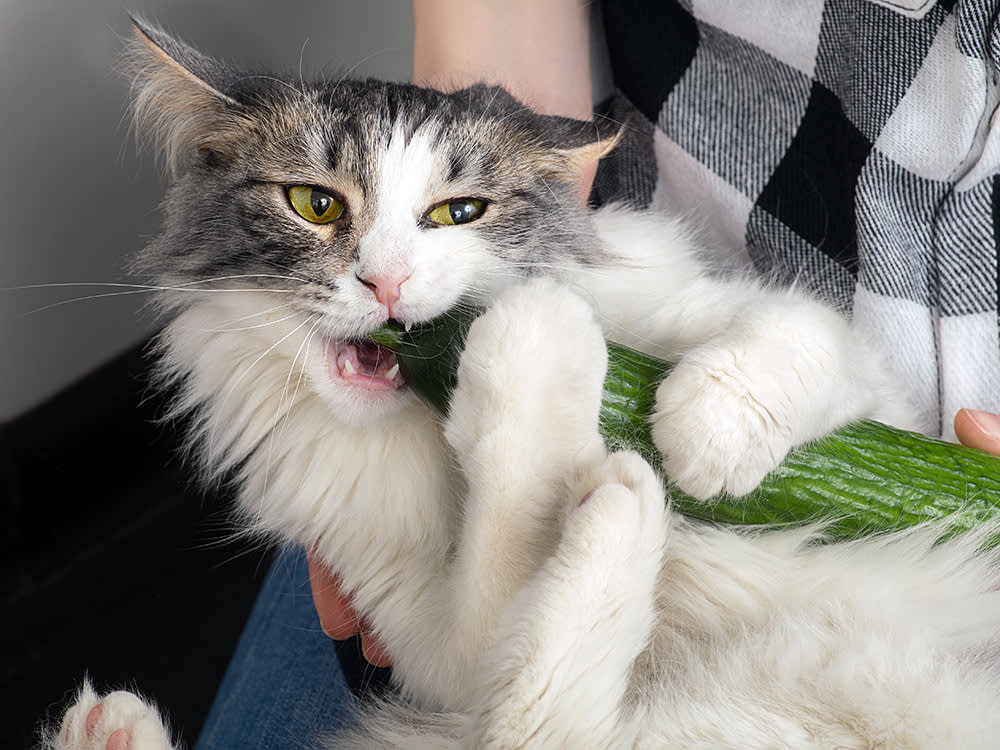
Share Article
If you’ve seen the videos of cats being scared out of their mindsopens in new tab by cucumbers, you may be wondering if cucumbers are safe for cats to eat. Despite their terrifying reactions to being surprised by a random cucumber, yes, cats can snack on a small amount of cucumber if they enjoy it.
But you should definitely not terrorize your cat with a cucumber, or any other snacks for that matter. Read on to learn about sharing cukes with your kitty.
Nutrition facts about cucumbers for cats
Cucumbers are technically a fruit of the Cucumis sativus plant, which is part of the larger gourd family of plants known as Cucurbitaceae. They are native to regions of the Himalayas and Thailand but are now grown worldwide as a food crop. Compared to many other vegetables, cucumbers are considered to be somewhat basic when it comes to their nutrient profile.
They contain a large amount of water and some fiber and are very low in calories. They also have some beneficial plant compounds, including antioxidants and cucurbitacin. While cats can benefit from some of the nutrients in cucumbers, this is not a food that is required in their diet.
As obligate carnivores, they rely primarily on animal-based meat sources for the nutrients they need most and have higher requirements for proteins and fats. With that in mind, cucumbers and other snacks should be kept to a minimum to ensure they get the bulk of their nutrients from a complete and balanced cat food that will provide them with the nutrients their bodies really need. But if you have a cat who just loves a crunchy, juicy snack, cucumbers may be a good choice.
Are cucumbers good for cats?
Cucumbers are non-toxic and safe for cats to eat; however, they do not provide any of the major nutrients that cats really need for optimum health. They should not be offered as more than an occasional snack since it is important that cats fill up on a balanced diet and not overeat on snacks and treats. As an occasional snack, cucumber can be a good choice for the following reasons:
High water content: Cucumbers are about 95 percent water, giving them that juicy, satisfying crunch and providing vital hydration. Many cats do not drink much water so finding ways to get a little extra water into their diet can be helpful, especially for cats with certain health conditions like urinary problems or kidney disease.
Good source of fiber: Cucumbers contain fiber, mostly in their skin, that is beneficial to digestive health. Fiber helps to bulk up the stool, prevent constipation, create feelings of fullness, and can support the good microbes in the gut.
Low in sugar: Cucumbers are low in sugar and overall calories. This can make them a good snack for cats by providing a satisfying crunchy treat without risk of overfeeding and/or weight gainopens in new tab which can lead to related health problems.
Antioxidants and cucurbitacin: Cucumbers contain many interesting plant compounds that may have health benefits too. Cucurbitacins are the reason some cucumbers can taste bitter, especially the skin, but they are also being studied for their possible anti-cancer properties as well as possible anti-inflammatory, antimicrobial, and anti-diabetic effects.
Cucumbers also contain other antioxidants, which can protect against damage from free radicals and may protect against the effects of aging and certain cancers.
Can cats eat any part of the cucumber plant?
The entire cucumber plant, including the leaves, stems, and flowers, is considered nontoxic to cats, so it would be ok if your cat chewed on the plant or ate a bite or two. Plant matter is very fibrous, however, and if your cat were to eat a lot of it, they will likely experience digestive upset including vomiting, diarrhea, gas, and/or bloating. Also, due to the cucurbitacin compound in the plant, many parts of the plant will taste very bitter, which may deter your cat from eating too much of it anyway.
Are cucumbers completely safe for cats?
In small amounts, cucumbers are very safe for cats to eat. There are a few important points to keep in mind when sharing cucumbers with your cat:
Fiber: Cucumbers contain fiber, especially in their skin. While some fiber is healthy for cats, eating too much in one sitting can cause digestive upset, especially if they are not accustomed to it. Start by offering a small bite-sized amount to your cat and even consider peeling the skin off, to see how they tolerate it before offering any more.
Bitterness: Cucurbitacin is the compound in cucumbers that can make them taste bitter. It is not harmful to cats but may make them averse to eating cucumbers. Peeling the skin can help to remove some of the bitterness.
Other ingredients: Be mindful of sharing cucumbers that are part of a prepared dish as those that have been pickled. While the cucumber itself is safe for cats, some added seasonings, such as garlic and onions, can be toxic. Other ingredients may be unhealthy for cats, including the high salt content often found in pickles, as well as dishes with dairy products or lots of sugar.
Other foods that are safe for cats
Strawberries and other berries that are lower in sugar can be an occasional snack.
Shrimp can be a high-protein snack.
Carrots can also be a safe snack in moderation
Other foods that are dangerous
Chocolate is toxic to cats and should be kept out of reach.
Dog food can be OK for the occasional taste, but it is not a safe substitute for a complete and balanced cat food.
Dairy products, like cheese, can lead to digestive upset for cats because they are lactose-intolerant.
The bottom line: Can cats eat human food?
Cats can eat many human foods, but because their nutritional needs are quite different from ours, it is important to keep the treats and table snacks to a minimum. Cats need to get the bulk of their diet from a complete and balanced cat food so that all of their nutritional requirements are satisfied.
Filling up on too many treats and table foods could put them at risk for nutritional deficiencies that can lead to serious illness over time. A good rule of thumb is that all treats and table snacks should be less than 10 percent of your cat’s total caloric intake.
This ensures they get all of their needs met from a balanced cat food diet, and also prevents overfeeding which can lead to unnecessary weight gain. Many cats that live indoors tend to be sedentary and the combination of limited activity with overfeeding is often what leads to obesity and related health problems including diabetes and/or arthritis in cats.
Kitties will also benefit from opportunities to be more active and mentally engaged. There are so many ways to get creative and have fun playing with your cat, creating obstacle courses for them, and using food puzzles and interactive toys to enrich their lives and keep them active while introducing the occasional new treat.
FAQs (People also ask):
How much cucumber can a cat eat?
Start with a bite-sized amount to ensure your cat can tolerate it. If they are used to eating fibrous foods, you can offer more but should limit it to no more than 10 percent of their total intake.
Is it OK to give cats cucumbers?
Cucumbers are a safe and nontoxic snack and is OK in moderation.
Why do cats like cucumbers?
Cucumbers are juicy and crunchy and they may enjoy the texture but the bitterness may turn some cats off.
References:
ASPCA Poison Control: Foods You Can Safely Share with your Petopens in new tab
North Carolina Extension Gardener: Cucumis Sativusopens in new tab

Dr. Amy Fox, DVM
Amy Fox, DVM is a small animal veterinarian in New York City. A lifelong animal lover, Dr. Fox studied biology in college and then worked as a veterinary nurse before pursuing veterinary school at Cornell University. She has worked in many different settings including shelter medicine, emergency medicine, general practice, and animal cruelty and forensics. She is especially interested in nutrition, preventative medicine and care for senior pets. Dr. Fox also enjoys writing about veterinary medicine and teaching. In her free time she loves to cook, garden, and go for long runs.
Related articles
Can Cats Eat Shrimp?
They definitely want to...
![Woman feeding her puffy cat at the table.]()
What Human Foods Can Cats Eat?
We know they’re begging—but what’s safe to share?
![A cute gray cat lies next to candles and cinnamon sticks on a beige bedspread.]()
Can Cats Eat Cinnamon?
You love the spice in your mulled wine and cider. Learn if your cat can enjoy it.
![Man feeding rice to cat with chopsticks at dinner table]()
Can Cats Eat Rice?
A warm bowl of rice is your cat’s version of comfort food.
![Cat behind a curtain attempting to get fruit in blue bowl]()
What Fruits and Veggies Can Your Cat Feast On?
Pass the fruit bowl — it’s treat time.
![Grey cat eats a strawberry]()
Can Cats Eat Strawberries
Yes, strawberries are a nutritious treat for dogs.


